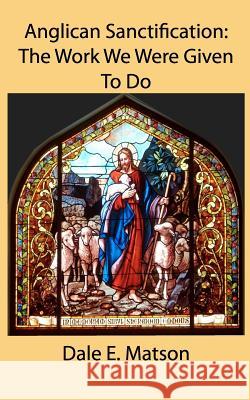Anglican Sanctification: The Work We Were Given To Do » książka
Anglican Sanctification: The Work We Were Given To Do
ISBN-13: 9781466330269 / Angielski / Miękka / 2011 / 148 str.
As both a psychologist and an Anglican Priest, I ask myself questions: What constitutes the attributes of a Christian? How are Christians different than those who are not Christians? Are new Christians different from older Christians? Is there some kind of emotional patina evident to others as Christians age? From the perspective of science, does Christianity offer a method or treatment with observable outcomes? Does regular church attendance, Scripture reading and service to others make a difference? Do we become what we practice? Is there a change of personality sometimes referred to as conversion of manners? Is what we call the fruits of the Spirit evident in Christian lives? Do Christians respond differently to the events in their world? Are they more resilient than others? My answer to all of these questions is, "Yes." We cannot depend on our culture to be the good soil for the growth of the Kingdom of God nor should we. I believe it is our Lord's charge to His church to feed His sheep and equip His saints for service. We must not allow ourselves to be co-opted by the culture. As a church, we may not allow our work, the work Christ gave us to do, to be outsourced to our governments. We must do what we have traditionally done and that is to prepare our sheep in this life as citizens for God's Kingdom now and in eternity. Ultimately, the difference in a culture is made by any Christian who listens to God and is willing to take on the unique assignment that God offers. It is a spiritual niche that will give purpose and meaning to the life of any individual. As our collect for Morning Prayer states, in part, "To know Him is eternal life and to serve Him is perfect freedom." This niche may change over time but it is assignments that can make the sun stand still if necessary. It is an assignment of good works, the works we were called to walk in. Christians have treatment efficacy as they walk and talk and play and laugh......and become whole and holy themselves. It is about Christians as change agents in the world. The church is on this earth to proclaim the good news of Jesus Christ but it is also here as a restraint to evil. In light of this, as an ordinary Christian, I would like to make a case for what it means to be a Christian in a culture that is increasingly pagan and sometimes openly hostile to Christians. What is the path the ordinary Christian is intended to walk as he or she matures in the faith? In a sense, this is my story too. It is an expanded testimony to what God can do with an ordinary person, broken and sinful, seeking death, killing himself on the installment plan. If you want to be whole and holy, I have included things that have helped me. There is a design and discipline to the Anglican Christian Life. The boundaries are useful and guiding but not confining. This is not a call for you to seek holy orders. This is a call for you as members of Christ's church to become more deeply involved in your own spiritual development. You are the church. You are acting on behalf of Christ in this world. As Isaiah states, "Listen to me, you who follow after righteousness, you who seek the Lord: "Look to the rock from which you were hewn."(Isa. 51:1) and that rock is the church. The most important thing we can do as Christians is to build our testimony with God's help. It is our Christian resume. We are called to witness the truth to a world that no longer knows right from wrong. We can do this if we model our faith but first we must learn and practice that faith for which our Lord gave His precious and perfect life. This book is a kind of primer for those who are investigating the Traditional Christian faith and those who are Christians wanting to go more deeply into the faith lived in a sacramental and monastic way.
Zawartość książki może nie spełniać oczekiwań – reklamacje nie obejmują treści, która mogła nie być redakcyjnie ani merytorycznie opracowana.











